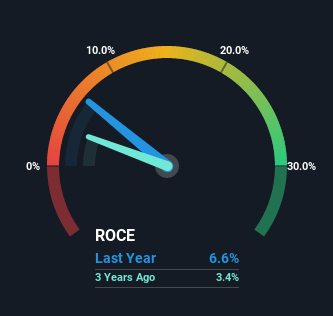Returns On Capital Signal Difficult Times Ahead For Air France-KLM (EPA:AF)

When researching a stock for investment, what can tell us that the company is in decline? A business that's potentially in decline often shows two trends, a return on capital employed (ROCE) that's declining, and a base of capital employed that's also declining. This reveals that the company isn't compounding shareholder wealth because returns are falling and its net asset base is shrinking. Having said that, after a brief look, Air France-KLM (EPA:AF) we aren't filled with optimism, but let's investigate further.
Return On Capital Employed (ROCE): What Is It?
For those who don't know, ROCE is a measure of a company's yearly pre-tax profit (its return), relative to the capital employed in the business. To calculate this metric for Air France-KLM, this is the formula:
Return on Capital Employed = Earnings Before Interest and Tax (EBIT) ÷ (Total Assets - Current Liabilities)
0.066 = €1.1b ÷ (€32b - €16b) (Based on the trailing twelve months to March 2023).
Thus, Air France-KLM has an ROCE of 6.6%. Ultimately, that's a low return and it under-performs the Airlines industry average of 13%.
View our latest analysis for Air France-KLM

Above you can see how the current ROCE for Air France-KLM compares to its prior returns on capital, but there's only so much you can tell from the past. If you'd like to see what analysts are forecasting going forward, you should check out our free report for Air France-KLM.
What Does the ROCE Trend For Air France-KLM Tell Us?
In terms of Air France-KLM's historical ROCE movements, the trend doesn't inspire confidence. To be more specific, the ROCE was 11% five years ago, but since then it has dropped noticeably. Meanwhile, capital employed in the business has stayed roughly the flat over the period. Companies that exhibit these attributes tend to not be shrinking, but they can be mature and facing pressure on their margins from competition. So because these trends aren't typically conducive to creating a multi-bagger, we wouldn't hold our breath on Air France-KLM becoming one if things continue as they have.
On a separate but related note, it's important to know that Air France-KLM has a current liabilities to total assets ratio of 50%, which we'd consider pretty high. This can bring about some risks because the company is basically operating with a rather large reliance on its suppliers or other sorts of short-term creditors. Ideally we'd like to see this reduce as that would mean fewer obligations bearing risks.
Our Take On Air France-KLM's ROCE
In summary, it's unfortunate that Air France-KLM is generating lower returns from the same amount of capital. Long term shareholders who've owned the stock over the last five years have experienced a 51% depreciation in their investment, so it appears the market might not like these trends either. That being the case, unless the underlying trends revert to a more positive trajectory, we'd consider looking elsewhere.
Air France-KLM does come with some risks though, we found 3 warning signs in our investment analysis, and 2 of those are a bit concerning...
While Air France-KLM isn't earning the highest return, check out this free list of companies that are earning high returns on equity with solid balance sheets.
New: Manage All Your Stock Portfolios in One Place
We've created the ultimate portfolio companion for stock investors, and it's free.
• Connect an unlimited number of Portfolios and see your total in one currency
• Be alerted to new Warning Signs or Risks via email or mobile
• Track the Fair Value of your stocks
Have feedback on this article? Concerned about the content? Get in touch with us directly. Alternatively, email editorial-team (at) simplywallst.com.
This article by Simply Wall St is general in nature. We provide commentary based on historical data and analyst forecasts only using an unbiased methodology and our articles are not intended to be financial advice. It does not constitute a recommendation to buy or sell any stock, and does not take account of your objectives, or your financial situation. We aim to bring you long-term focused analysis driven by fundamental data. Note that our analysis may not factor in the latest price-sensitive company announcements or qualitative material. Simply Wall St has no position in any stocks mentioned.
About ENXTPA:AF
Air France-KLM
Provides passenger and cargo transportation services and aircraft maintenance in Metropolitan France, Benelux, rest of Europe, and internationally.
Reasonable growth potential with questionable track record.
Similar Companies
Market Insights
Community Narratives




